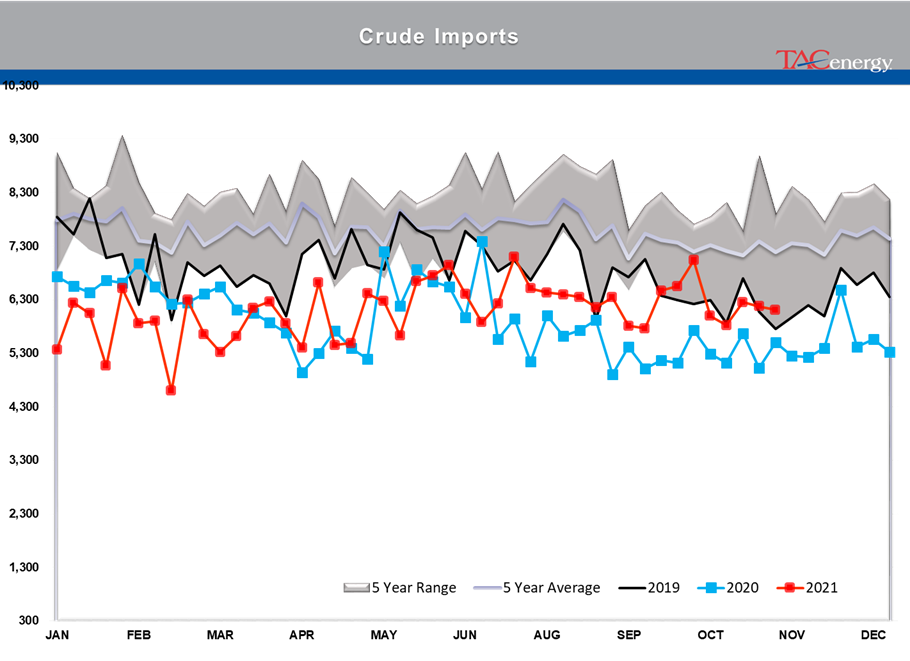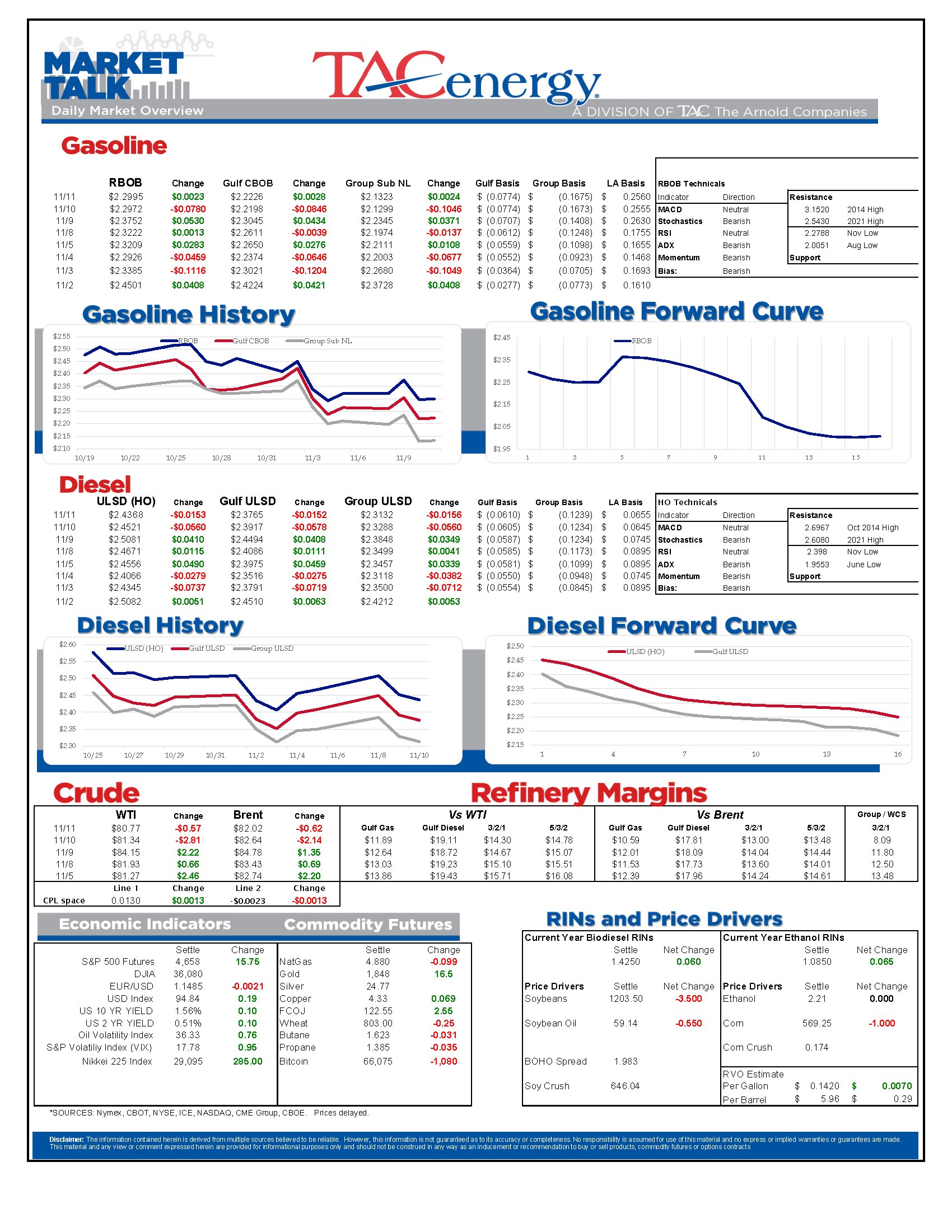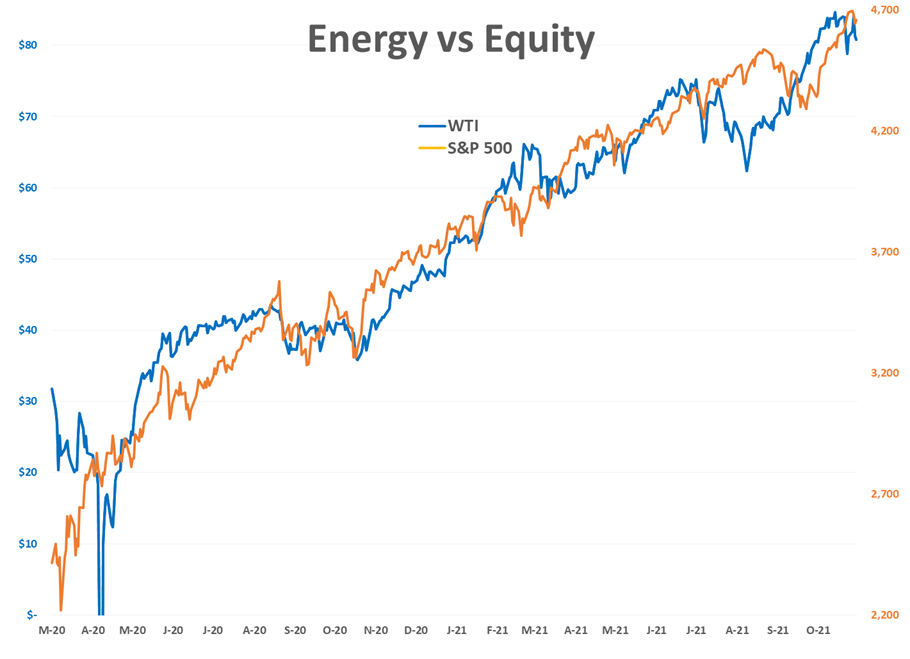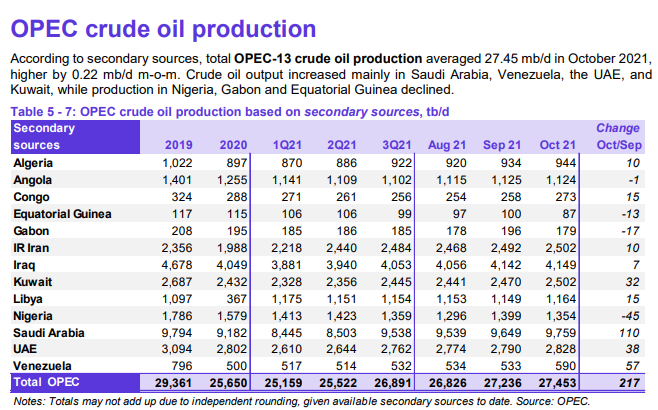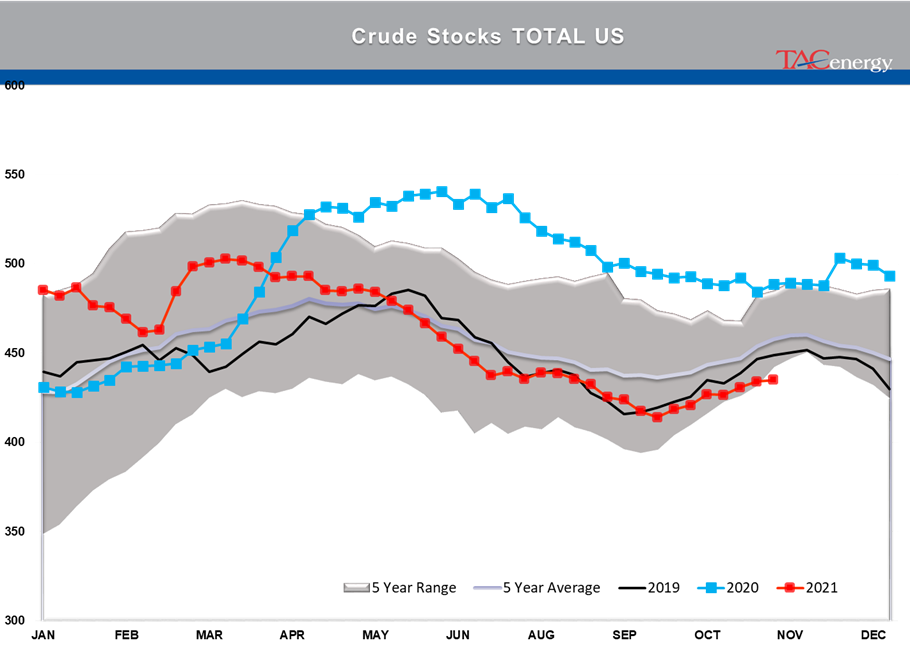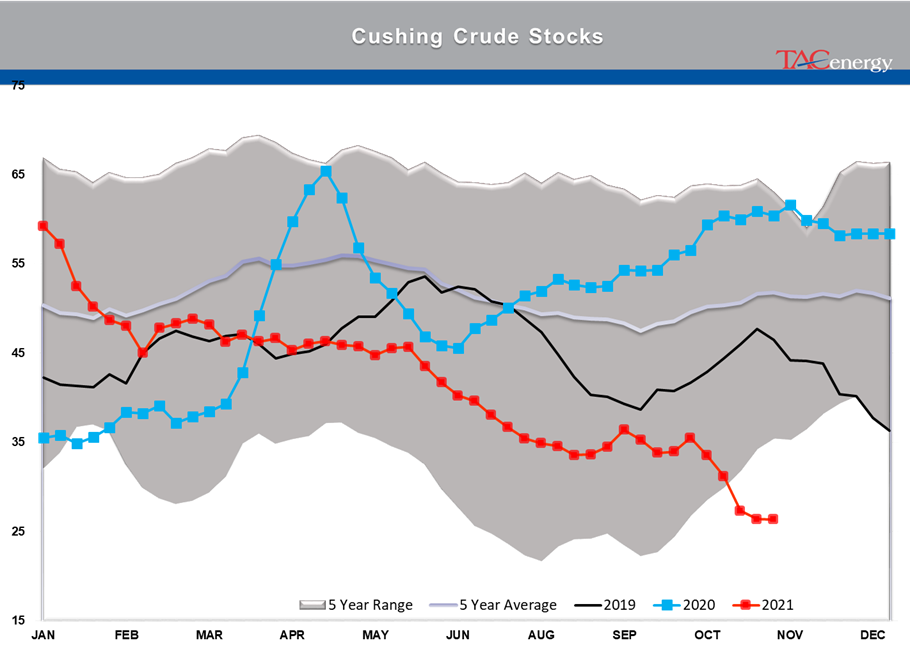The Highest Inflation Reading In 30 Years

The highest inflation reading in 30 years sparked a round of risk-off selling Wednesday as traders seem concerned that these rising prices can no longer be considered transitory, which will force the FED to tighten its monetary policy sooner than later. Energy and equity markets were both caught up in the selling early in the session, the DOE’s weekly report didn’t help as petroleum futures continued moving lower throughout the day.
The big selloff keeps the rounding top pattern in play for RBOB, with a good chance that we’ll see another 20 cent drop if prices break below $2.25 in the next week or so. WTI and ULSD are more neutral technically that gasoline, and also have a better seasonal outlook, but need to hold above last week’s lows of $2.39 for ULSD and $78 for WTI to avoid another move lower.
The total US petroleum demand estimate for the week dipped below 2020 levels for the first time since March, when we were comparing to pre-lockdown levels. While the DOE’s weekly consumption estimates are notoriously volatile, they did offer a harsh reminder that demand doesn’t only move higher after 18 months of recovery, especially this time of year. Charts from the DOE’s weekly report are below.
OPEC’s monthly oil market report kept forecasted supply and demand figures steady for next year, but like the EIA’s outlook earlier this week noted that gas-to-oil switching for electricity generation should boost demand and prices this winter. The cartel’s oil output continued moving higher in October as they made good on the plan to slowly return production to the global stage. The report also highlighted the recovery in refining margins globally over the past few months that is helping keep some plants that were on the verge of permanently closing still operating.
A surprise agreement between the US & China announced Wednesday may end up being the most meaningful result of the COP26 meetings, as the 2 largest emitters in the world account for roughly 40% of greenhouse gases. As with most of the pledges made at this conference, the details are scarce, and it’s likely to take years before actual changes are made, but the sign of cooperation does open the door to more US exports of LNG replacing Chinese coal, which is arguably the most impactful step available to reduce emissions short term.
We will be attending our company’s annual meeting tomorrow and will not send out an update in the morning.
Latest Posts
Refined Products Holding Close To Break Even While Oil Prices Are Losing Just Under 1%
Markets Rallying To End The Week, Diesel Prices Lead The Way For Energy
Energy Markets Rally Again Thursday After A Choppy Wednesday Session
Week 16 - US DOE Inventory Recap
Social Media
News & Views
View All
Refined Products Holding Close To Break Even While Oil Prices Are Losing Just Under 1%
Energy markets are vacillating this morning with refined products holding close to break even while oil prices are losing just under 1%.
Negotiators are meeting in Egypt this week to try and hammer out a truce in Gaza, even as Israeli airstrikes intensify. The Red Sea has continued to be active after a few weeks of relative calm, with multiple strikes reported over the weekend and another this morning.
Ukrainian drones targeted two more Russian oil refineries over the weekend, and at least one facility was reportedly taken offline as a result which means two things: Ukraine isn’t listening to US requests to stop targeting refineries, using nets to protect refineries isn’t working yet.
The CFTC’s weekly Commitments of Traders report gave a glimpse into the speculative liquidation (AKA clowns exiting the Volkswagen) that occurred in energy contracts after the direct conflict between Iran and Israel fizzled. Money managers saw heavy long liquidation, with both Brent and WTI dropping nearly 10% on the week. The only contract to see an increase in net length in last week’s report was ULSD, which had been the weak link in the complex for most of the year. ULSD did see a healthy amount of length liquidated, but that was offset by short covering as prices reached 5-month lows to create a very small net increase.
Baker Hughes reported a drop of 5 oil rigs and 1 natural gas rig drilling in the US last week, with Louisiana accounting for the majority of the decline. Pipeline capacity continues to be a limiting factor for many producers, and an RBN energy blog this morning suggests that things are about to get worse in the Permian when major pipeline maintenance occurs in June.
A fire was reported at CVR’s Wynnewood Oklahoma refinery over the weekend, although it’s unclear if the deadly storms that swept through the region played a role in that event.
Marathon’s Galveston Bay refinery reported an upset Friday that knocked a coking unit offline, but said operations were already resuming. That facility was the most-frequent TCEQ reporter last year but has been relatively quiet over the past couple of months.
Today’s interesting read courtesy of the Financial Times: How Europe solved its Russian gas crisis.
Click here to download a PDF of today's TACenergy Market Talk.

Markets Rallying To End The Week, Diesel Prices Lead The Way For Energy
Energy markets are rallying to end the week, with diesel prices leading the way up 2.5 cents in the early going. Equity markets are also rallying after a big Thursday selloff as strong tech earnings seem to be outweighing the FED’s favorite inflation gauge remaining stubbornly high.
RBOB gasoline futures are trading higher for a 4th straight day, but despite bouncing nearly 14 cents from Tuesday’s low, they still need to rally another nickel to break the downward sloping pattern forming on the weekly charts. Seasonal factors could go either way for gasoline for the next few weeks as we’re in the Spring peaking window, and while the high set April 12th would fit the annual pattern nicely, a May price peak is certainly not unusual, and if $2.85 is broken it seems like RBOB will run to $3 in a hurry.
Diesel prices have bounced 7 cents after touching a 5-month low on Monday but need to climb back above $2.60 to reduce the chance of a slide to $2.20 or lower should the chart support around $2.50 break down.
Back to the shadow war: After a relatively quiet few weeks in the Red Sea, Houthi attacks on ships have started again over the past few days, although so far, no major damage has been reported.
ExxonMobil reported another strong quarter in Q1 with more than $10 billion in free cash flow generated, even though earnings in its refining segment were down 67% from the first quarter of last year. The company noted the success of its Beaumont refinery expansion that came online last year and marked the only major refinery expansion in the US in over a decade. It's worth noting that within the refining segment, international earnings suffered more than domestic facilities did, with non-US refining earnings down 77% from a year ago as crack spreads came back to reality after the record-setting quarters in 2022 and 2023.
Chevron followed a similar pattern (as expected) in its Q1 report, noting strong operating cash flows of $6.8 billion in total, despite downstream earnings falling more than 56% for the quarter.
The company also highlighted its expanding marketing network along the US West and Gulf Coast markets encompassing more than 250 retail stations and highlighted its new solar-to-hydrogen project in California.
Phillips 66 continued the trend, reporting a “strong” quarter in which earnings were 63% lower than a year ago. The company highlighted the conversion of its Rodeo refinery which is now producing roughly 30mb/day of RD and is expected to ramp up to 50mb/day in the 2nd quarter. That facility had a capacity of more than 120mb/day prior to its conversion, and it used to produce gasoline along with its diesel. The company also noted its ongoing plans to sell assets that no longer fit its strategy, highlighting retail assets in Germany and Austria as being on the chopping block, while not mentioning any of its US refining assets that have long been rumored to be for sale.
Delek reported another upset at its Alon Big Spring refinery Thursday, which has become another one of the TCEQ’s frequent fliers after suffering damage from the cold snaps in both 2021 and earlier this year.
A harsh reality sinking in: Mexico’s President has made plenty of headlines with fictitious claims of energy sovereignty in the past few years, but not only is the country’s new Dos Bocas refinery still not producing finished products on any sort of meaningful scale, two of its other facilities have suffered fires recently forcing the country to import even more product from the US. This phenomenon continues to help US Gulf and West coast refiners who would be struggling (even more) to move their excess with sluggish domestic demand.
Click here to download a PDF of today's TACenergy Market Talk.

Energy Markets Rally Again Thursday After A Choppy Wednesday Session
Energy markets are trying to rally again Thursday after a choppy Wednesday session. RBOB gasoline futures are leading the push higher, on pace for a 3rd consecutive day of gains after finding a temporary floor Tuesday and have added 12 cents from those lows.
Equity markets are pointing sharply lower after a weak Q1 GDP estimate which seems to have contributed to a pullback in product prices over the past few minutes, but don’t be surprised if the “bad news is good news” low interest rate junkies start jumping in later on.
The DOE’s weekly report showed sluggish demand for gasoline and diesel, but inventory levels in most markets continue to follow their typical seasonal trends. Refinery runs held fairly steady last week with crude inputs down slightly but total gross throughputs up slightly as most facilities are now back online from a busy spring maintenance season and geared up for peak demand this summer.
Propane and propylene exports spiked to a record high north of 2.3 million barrels/day last week, which demonstrates both the US’s growing influence on global product markets, and the steady shift towards “other” products besides traditional gasoline and diesel in the level of importance for refiners.
The EIA acknowledged this morning that its weak diesel consumption estimates reflected the switch to Renewable Diesel on the West Coast, although they did not provide any timeline for when that data will be included in the weekly survey. The agency acknowledged that more than 4% of the total US consumption is now a combination of RD and Biodiesel, and that number is expected to continue to grow this year. This morning’s note also suggested that weak manufacturing activity was to blame for the sluggish diesel demand across the US, while other reports suggest the freight recession continued through Q1 of this year, which is also contributing to the big shift from tight diesel markets to oversupplied in several regions.
Valero kicked off the Q1 earnings releases for refiners with solid net income of $1.2 billion that’s a far cry from the spectacular earnings north of $3 billion in the first quarter of 2023. The refining sector made $1.7 billion, down from $4.1 billion last year. That is a pattern that should be expected from other refiners as well as the industry returns to a more normal market after 2 unbelievable years. You wouldn’t guess it by looking at stock prices for refiners though, as they continue to trade near record highs despite the more modest earnings.
Another pattern we’re likely to see continue with other refiners is that Renewable earnings were down, despite a big increase in production as lower subsidies like RINs and LCFS credit values sting producers that rely on those to compete with traditional products. Valero’s SAF conversion project at its Diamond Green joint venture is progressing ahead of schedule and will give the company optionality to flip between RD and SAF depending on how the economics of those two products shakes out this year. Valero also shows part of why refiners continue to disappear in California, with operating expenses for its West Coast segment nearly 2X that of the other regions it operates in.
